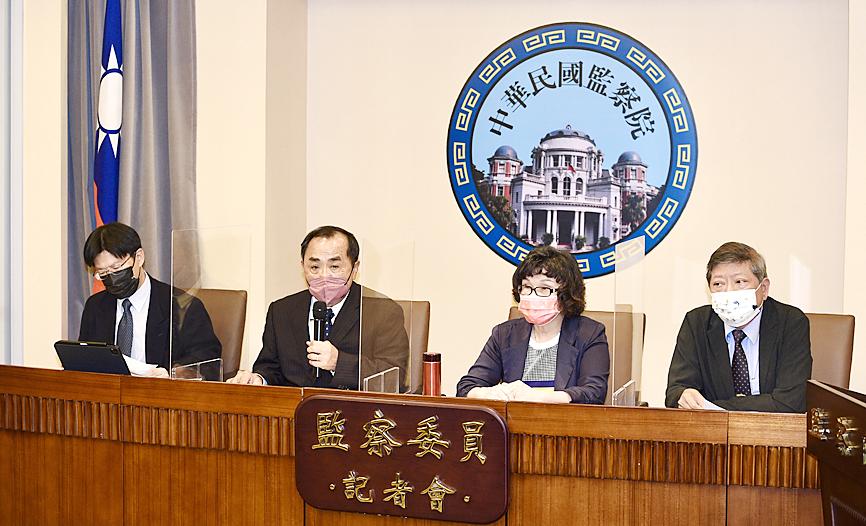The Control Yuan yesterday asked the Judicial Yuan’s Disciplinary Court to retry former Academia Sinica president Wong Chi-huey’s (翁啟惠) case after the court reprimanded Wong for not fully disclosing his assets and failing to recuse himself in a matter that could have led to a conflict of interest.
Wong, accused of having made illicit gains by purchasing OBI Pharma stock, was acquitted by the Shilin District Court in December 2018.
However, he was impeached by the Disciplinary Court in 2017 for not fully disclosing his assets during an asset report, a decision he has already appealed twice.

Photo: Peter Lo, Taipei Times
The March 8 amendment of Article 14-1 of the Enforcement Rules of the Control Act (監察法施行細則) gave Wong reason to launch another appeal.
“Should the [Disciplinary Court] find that there are grounds to reinvestigate a case, it should dispatch, or alternate between, two members of the former court presiding over the case to head the reinvestigation,” Article 14-1 states.
Wong is an internationally acclaimed academic and his reputation should not be impugned, Control Yuan members said yesterday, adding that he would not be the only individual to benefit from Article 14-1.
Freedom to conduct research is a constitutionally guaranteed right, and Academia Sinica, as the highest institution for independent research in the country, should have its research protected, they said.
The members called on the court to respect Academia Sinica’s decision regarding allegations that Wong had not recused himself from acts that might have caused a conflict of interest.
The Academia Sinica Principles on Handling Conflict of Interest (中央研究院科技移轉利益衝突迴避處理原則) as they stood on Aug. 14, 2012, did not make a distinction between the position a person held as an administrator or as an academic, they said.
There was no correlation between Wong as the creator of the technology being transferred, and Wong the institute’s highest-level administrator, the members said, adding that he had followed the rules and filled out the form declaring the possibility of a conflict of interest.
The regulations as they stood in 2012 did not state that the technology’s creator could not become a stock owner, the members said, adding that Academia Sinica’s opaque regulations on conflicts of interest should not carry over to an individual who had followed rules.
The Control Yuan’s investigation has found that, based on new evidence and facts, the original basis for the court reprimanding Wong was no longer valid, the members said.

Eight restaurants in Taiwan yesterday secured a one-star rating from the Michelin Guide Taiwan for the first time, while three one-star restaurants from last year’s edition were promoted to two stars. Forty-three restaurants were awarded one star this year, including 34 in Taipei, five in Taichung and four in Kaohsiung. Hosu (好嶼), Chuan Ya (川雅), Sushi Kajin (鮨嘉仁), aMaze (心宴), La Vie by Thomas Buhner, Yuan Yi (元一) and Frassi in Taipei and Front House (方蒔) in Kaohsiung received a one-star rating for the first time. Hosu is known for innovative Taiwanese dishes, while Chuan Ya serves Sichuan cuisine and aMaze specializes

STATS: Taiwan’s average life expectancy of 80.77 years was lower than that of Japan, Singapore and South Korea, but higher than in China, Malaysia and Indonesia Taiwan’s average life expectancy last year increased to 80.77 years, but was still not back to its pre-COVID-19 pandemic peak of 81.32 years in 2020, the Ministry of the Interior said yesterday. The average life expectancy last year increased the 0.54 years from 2023, the ministry said in a statement. For men and women, the average life expectancy last year was 77.42 years and 84.30 years respectively, up 0.48 years and 0.56 years from the previous year. Taiwan’s average life expectancy peaked at 81.32 years in 2020, as the nation was relatively unaffected by the pandemic that year. The metric

Taitung County is to launch charter flights to Malaysia at the end of this year, after setting up flights to Vietnam and Thailand, the Taitung County Government said yesterday. The new charter flight services, provided by low-cost carrier Batik Air Malaysia, would be part of five-day tour packages for visits to Taitung County or Malaysia. The Batik Air charter flight, with about 200 seats, would take Malaysian tourists to Taitung on Dec. 30 and then at 12:35pm return to Kuala Lumpur with Taiwanese tourists. Another charter flight would bring the Taiwanese home on Jan. 3 next year, arriving at 5:30pm, before taking the

Taiwan High Speed Rail Corp. (THSRC) plans to ease strained capacity during peak hours by introducing new fare rules restricting passengers traveling without reserved seats in 2026, company Chairman Shih Che (史哲) said Wednesday. THSRC needs to tackle its capacity issue because there have been several occasions where passengers holding tickets with reserved seats did not make it onto their train in stations packed with individuals traveling without a reserved seat, Shih told reporters in a joint interview in Taipei. Non-reserved seats allow travelers maximum flexibility, but it has led to issues relating to quality of service and safety concerns, especially during